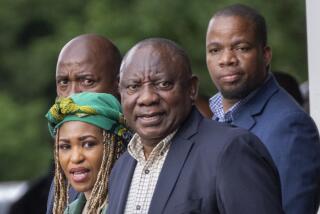S. African Cabinet Member Found Dead : Apparent Suicide Poses Election Problems for Botha and Party
- Share via
JOHANNESBURG, South Africa — John W. E. Wiley, minister of environmental affairs and tourism in President Pieter W. Botha’s Cabinet, was found dead at his home outside Cape Town on Sunday, an apparent suicide.
Wiley, 60, was found on his bed with a bullet wound in his right temple and a .32-caliber pistol at his side, according to the police, who said that “no crime is suspected” but that their investigation will continue.
Botha visited the tightly guarded home Sunday afternoon to convey his personal sympathy to the Wiley family, and he later expressed the Cabinet’s “great dismay” at the minister’s suicide.
“The devastating news of the sudden death of our colleague has shocked us to the hilt,” Botha said in a statement in Cape Town.
Problems for Botha
Wiley’s death at the start of a parliamentary election campaign poses immediate political problems for Botha and his ruling National Party.
He was the only English-speaking Nationalist minister in Botha’s largely Afrikaner Cabinet, and the party had counted heavily upon him as a vote-getter and advocate of gradual political reform in the May 6 whites-only election.
“He was an original thinker and dedicated to his work,” Botha said, praising Wiley as a man who got “to the crux of a matter quickly” and then achieved results.
“He devoted himself, particularly during the last few years, to the creation of a better understanding and greater cooperation between English- and Afrikaans-speaking South Africans. In this respect, I considered him both a pioneer and an adviser.”
Wiley had faced the toughest campaign in his 21 years in Parliament with a strong challenge from a longtime journalistic critic, John Scott, who resigned as assistant editor of the Cape Times to run as the Progressive Federal Party candidate against him in the Simonstown constituency on the Cape of Good Hope.
Financial Problems Suspected
Political associates suggested that financial problems, perhaps stemming from land speculation or other difficulties faced by a family company, had probably led Wiley to suicide. He had recently been trying to sell considerable amounts of property, these sources said, but had little success because of South Africa’s severely depressed economy.
With nominations closing Tuesday morning, the National Party had less than 48 hours to find a new candidate for a constituency that Wiley himself expected to have difficulty holding.
Concern was also quietly expressed Sunday in Nationalist circles about the stigma attached to suicide in this morally conservative and highly traditional society.
Wiley was a dedicated political conservative from his university days, and he had represented Simonstown for three different parties, breaking with the old United Party when liberals took over its leadership, then forming his own South African Party with other conservatives and eventually joining the ruling National Party in 1980 under Botha’s leadership.
A lawyer and businessman, Wiley became a deputy minister in 1982 and the minister of environmental affairs in 1984, bringing considerable expertise to the Cabinet.
Was Politically Combative
Quick-tempered and politically combative, he had a running feud with South Africa’s English-language newspapers, particularly the local Cape Times. He regularly accused the Cape Times of subversion and sedition in what he saw as an attempt to hand the country over either to the huge mining and manufacturing conglomerates that control much of the economy or to the South African Communist Party.
Wiley had studied at the University of Cape Town and later received an honors degree in law at Oxford University. His dedication to environmental protection and wildlife conservation was widely recognized, even by his critics on the political left.
A hard-hitting election campaign lies ahead for the country’s white politicians.
“It’s going to be a dirty fight,” the Sunday Star newspaper said in a front-page headline after a dispute arose on the weekend over campaign funds for three reformist independent candidates.
The “gloves are off,” the paper said, accusing the Nationalists of starting a “bitter mud-slinging match” with the three independents who split from the party to demand faster reform of apartheid.
D.J. Louis Nel, former deputy minister for information, fired the Nationalists’ first broadside with an allegation that the independents had probably broken the law by raising money through newspaper advertisements without government permission.
Botha followed by asking whether the independents had received funds from abroad, illegal for a South African political party.
Deny Allegations
The “New Nats,” as they have been dubbed and who include Denis Worrall, South Africa’s former ambassador to Britain, and Wynand Malan, once a leading Nationalist member of Parliament, hotly denied the allegations, saying all their funds have been raised within South Africa.
Another newspaper report, on the front page of the Sunday Times, focused on Nel’s own involvement in a $180-million bid by Japanese businessmen to buy South African Embassy land in Tokyo.
The newspaper said that Nel, who resumed his private law practice after being dropped from the Cabinet in November, was acting as consultant for the Japanese consortium. As an agent for the Japanese, he might make more than $450,000 from the deal, the newspaper said. However, Nel said he will be paid only “the normal professional fee.”
Supporters of the three independents said the New Nats are prepared for a propaganda campaign against them from the government, which has been worried about growing defections among traditional supporters, especially in Cape province.
More to Read
Sign up for Essential California
The most important California stories and recommendations in your inbox every morning.
You may occasionally receive promotional content from the Los Angeles Times.













